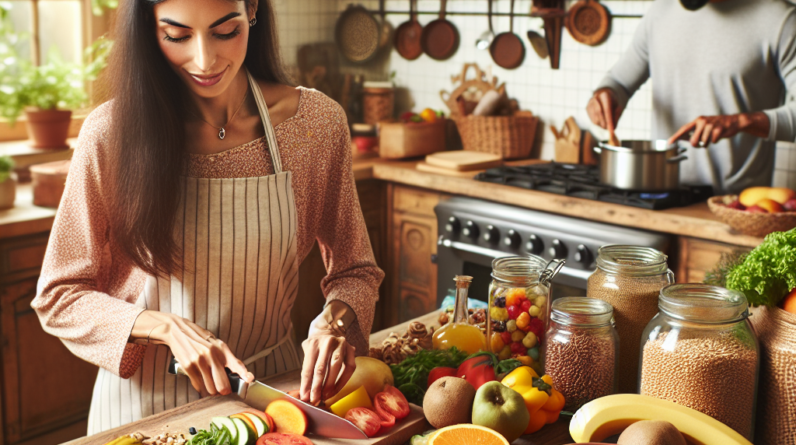
Understanding Whole Foods
What are Whole Foods?
Alright, so let’s start with the basics. Whole foods are basically foods that are as close to their natural state as possible. Think fruits, veggies, grains, nuts, and seeds. We’re talking about the stuff that doesn’t come with a long list of ingredients or processing. If you can picture it growing from the ground or hanging from a tree, chances are it’s a whole food!
Get a Huge Discount and Bonus! Try for 90 Days Risk Free
One of the coolest things about whole foods is that they’re packed with nutrients. Unlike processed foods that often lose their nutritional value, whole foods come loaded with vitamins, minerals, and antioxidants. It’s like nature’s gift to our bodies. They help us keep our energy levels up and our immune systems strong.
Plus, whole foods tend to be less calorie-dense than processed options. This means you can fill up on them without packing on the pounds. That’s definitely a win-win situation if you ask me!
The Benefits of Eating Whole Foods
Now, why should you care? Well, eating whole foods has a ton of benefits! First off, they can improve your overall health. Numerous studies suggest that diets rich in whole foods are linked to a lower risk of chronic diseases like diabetes and heart disease. When I started eating more whole foods, I truly felt a difference in my energy levels!
Not to mention, for anyone like me who struggles with gut health, whole foods can be a game-changer. They’re usually high in fiber, which is fantastic for digestion. Incorporating these foods into your meals can help keep your gut happy and healthy.
Lastly, there’s just a better sense of overall well-being when you fuel your body with these nutrient-rich options. I can’t tell you how great it feels to know I’m doing something good for my body with the food I eat!
How to Incorporate Whole Foods Into Your Diet
Getting started with whole foods doesn’t have to be complicated. In fact, I’d recommend starting small. Begin by swapping out one processed item a day with a whole food. Maybe replace that sugary breakfast cereal with oatmeal topped with fresh fruit.
Another fun way I’ve incorporated whole foods is by exploring local farmers’ markets. It’s a great way to not only find fresh produce but also learn about the food you’re eating. Plus, supporting local businesses can really boost your community!
And let’s not forget about meal prep! Preparing meals in advance using whole food ingredients can save you time during the busy week ahead. When you have healthy options easily available, you’re less likely to reach for unhealthy snacks. It’s all about making those small, intentional choices that build up over time!
Get a Huge Discount and Bonus! Try for 90 Days Risk Free
The Quality of Food Matters
Choosing Organic vs. Conventional
This is one topic I struggled with when I first began. Should I go organic? Conventional? Here’s the scoop. Organic foods are grown without synthetic pesticides and fertilizers, which is pretty appealing when you think about reducing chemical exposure in our diets.
It’s also important to consider that organic foods can sometimes be more nutrient-dense. However, they can come with a higher price tag. It’s all a balancing act! If buying organic for every item isn’t feasible, prioritize the foods with the highest pesticide loads.
At the end of the day, what matters is finding a balance that works for you. If it means buying some conventional produce but sneaking in organic options here and there, then go for it! The key is to focus on overall quality and making the best choices you can.
Freshness is Key
When looking for whole foods, freshness really makes a difference. It’s amazing how much better fresh fruits and vegetables taste compared to the stuff that’s been sitting on a shelf for ages. I always try to purchase seasonal produce because it’s often fresher and tastes way better!
Need a Serious Energy BOOST? Huge Discount Try for 90 Days Risk Free
Another tip? Shop at your local grocery store’s produce section often. You might be surprised at how quickly things can turn around with what’s available. Just the other day, I found some incredibly ripe avocados that were perfect for my guacamole!
By keeping your meals fresh and vibrant, you’re not only maximizing flavor but also packing in those wholesome nutrients that our bodies crave.
Mindful Eating
Mindful eating is a game-changer when it comes to food quality. It encourages you to slow down and appreciate the flavors and textures of your meals. When you’re enjoying whole foods, take a moment to consider where they came from and how they nourish your body.
While eating, try to minimize distractions—put away the phone or turn off the TV. This allows you to truly savor your food, and you might even find that you’re more satisfied with smaller portions because you’re actually present for your meal!
Merging the art of mindfulness with whole foods can lead to more conscious food choices in the long run. I’ve noticed that when I’m more mindful about my eating habits, I feel fuller and happier overall.
Cooking at Home
The Joy of Home-Cooked Meals
Cooking at home can be such a rewarding experience, and it’s an excellent way to take control of what you’re putting in your body. I remember the first time I tried to make a big salad with whole foods. I felt like a true chef whipping everything up from scratch!
Not only does cooking at home allow you to experiment with whole food ingredients, but it also helps you avoid the extra sugar, preservatives, and unhealthy fats often found in restaurant meals. Plus, there’s something about the smell of a home-cooked meal that just hits different!
Start with simple recipes that highlight whole foods. Look specifically for seasonal dishes that make use of what’s fresh right now. Before long, you’ll be whipping up whole food meals with confidence!
Exploring New Recipes
Sometimes it’s easy to get stuck in a rut when it comes to cooking. But don’t stress, there are countless resources online with fabulous whole food recipes just waiting to be discovered! I like to set aside a little time each week to scroll through different food blogs or watch cooking shows.
Good Health Solution is Easier Than Most People Think!
Take a Look for Yourself!
Trying new recipes not only adds variety to the usual meal rotation but also introduces you to ingredients you might not typically use. It’s fun to get creative in the kitchen, and who knows, you might even stumble upon a new favorite dish!
Also, invite friends over for a cooking night! Getting others involved makes it an enjoyable experience and can lead to a fantastic whole food feast!
Meal Prep Magic
Let’s chat about meal prepping! This is a total lifesaver for those of us with a busy lifestyle. Taking a couple of hours on the weekend to prep your meals can make a world of difference during the week. You’ll have whole food options ready to go, meaning no last-minute drive-through runs!
I like to cook large batches of grains or roasted veggies I can use throughout the week. Mixing and matching different whole food ingredients keeps meals interesting and flavorful. I promise, once you see how much time it saves, you’ll be hooked.
Remember, the key is to keep it simple and enjoyable. You don’t need to be a top chef to whip up some delicious whole foods! Get in the groove, and soon enough, meal prep will feel like a breeze.
Building Healthy Relationships with Food
Listening to Your Body
In my journey, I’ve realized how important it is to develop a healthy relationship with food. One of the first steps is learning to listen to your body. This means breaking away from the diet mentality and tuning into your hunger signals.
When you nourish your body with whole foods, it becomes easier to understand what your body needs. I like to ask myself how I feel before and after I eat. If I’m still hungry, I might grab a piece of fruit or some nuts instead of reaching for a snack filled with empty calories.
By taking a step back and checking in with myself, I can enjoy food without the guilt trip. It’s all about balance and finding what truly works for my body!
Overcoming Food Guilt
Let’s be real, food guilt can mess with your mind, and it can sneak in when you least expect it. We’ve all had those moments when we indulge a little too much. My advice? Let go of that guilt! Remember that food is meant to be enjoyed, and every once in a while, it’s perfectly okay to treat yourself.
Rather than focusing on guilt, think of moderation. If you indulge in a treat, balance it out with wholesome meals. Surrounding myself with supportive friends helps too. It’s awesome when you can share your ups and downs in your food journey with others.
Practicing self-compassion when it comes to food choices is crucial. We’re all human, and perfection doesn’t exist. Just embrace the learning process, and you’ll find a sense of freedom with your relationship with food.
Food as a Community
Food isn’t just about sustenance; it’s a way to connect with others. I’ve found that gathering with family and friends over meals can be one of the best parts of my life. Cookouts, potlucks, and family dinners not only allow us to enjoy whole foods together but also to strengthen our relationships.
Incorporating whole foods into communal meals encourages everyone to eat healthier too! Share your newfound love for whole foods—who knows, you might inspire someone else to join you on this path!
Let’s keep the conversation going and celebrate the joy food brings. Building a community around whole foods fosters support and can make healthy eating a lot more fun!
Conclusion
Embracing whole foods has been an incredible journey for me, and I hope sharing my experience might inspire you to explore this healthy lifestyle. Whether it’s learning to cook, shopping for high-quality ingredients, or building meaningful relationships with food, it all plays a role in our well-being.
Remember, you don’t need to overhaul your entire diet overnight. Start small, be kind to yourself, and enjoy the ride. Whole foods are more than just food; they’re a way to nourish our bodies, minds, and spirits. Cheers to health!
FAQ
1. What are some examples of whole foods?
Whole foods include fruits, vegetables, whole grains, legumes, nuts, and seeds. These foods are unprocessed or minimally processed and retain their natural nutrients.
2. Can I still enjoy processed foods?
Absolutely! It’s all about balance. You can enjoy processed foods in moderation, but try to base your diet primarily on whole foods for better health benefits.
3. How do I know which foods are organic?
Look for labels that specify “USDA Organic” or similar certifications. Organic foods typically have higher standards for growing practices. If you’re unsure, your local farmer’s market can also be a great resource!
4. Is cooking at home really that beneficial?
Yes! Cooking at home allows you to control the ingredients, avoid unhealthy additives, and get creative in the kitchen. Plus, it’s a rewarding experience that can bring loved ones together!
5. What if I don’t know how to cook?
No worries! There are tons of beginner-friendly resources out there. Start with simple recipes, watch cooking tutorials online, and practice regularly. You’ll become more comfortable over time!








